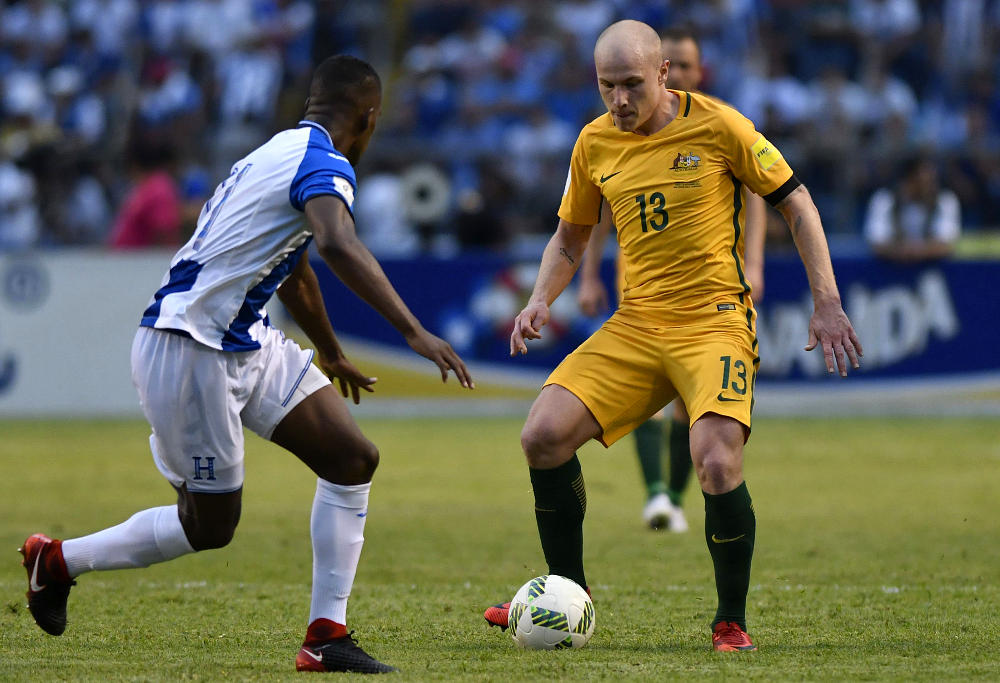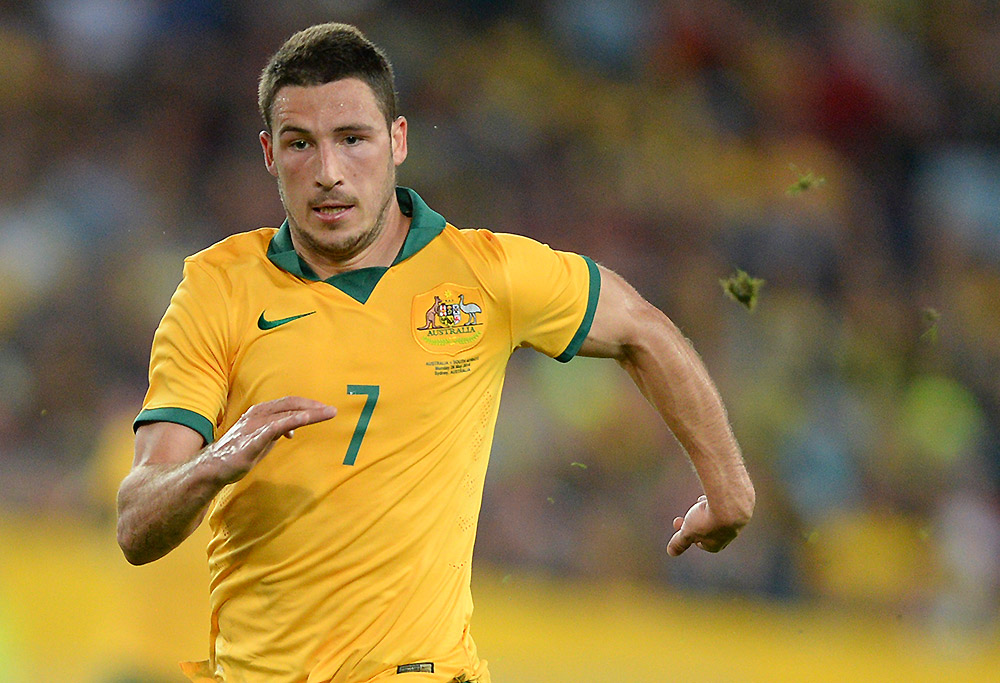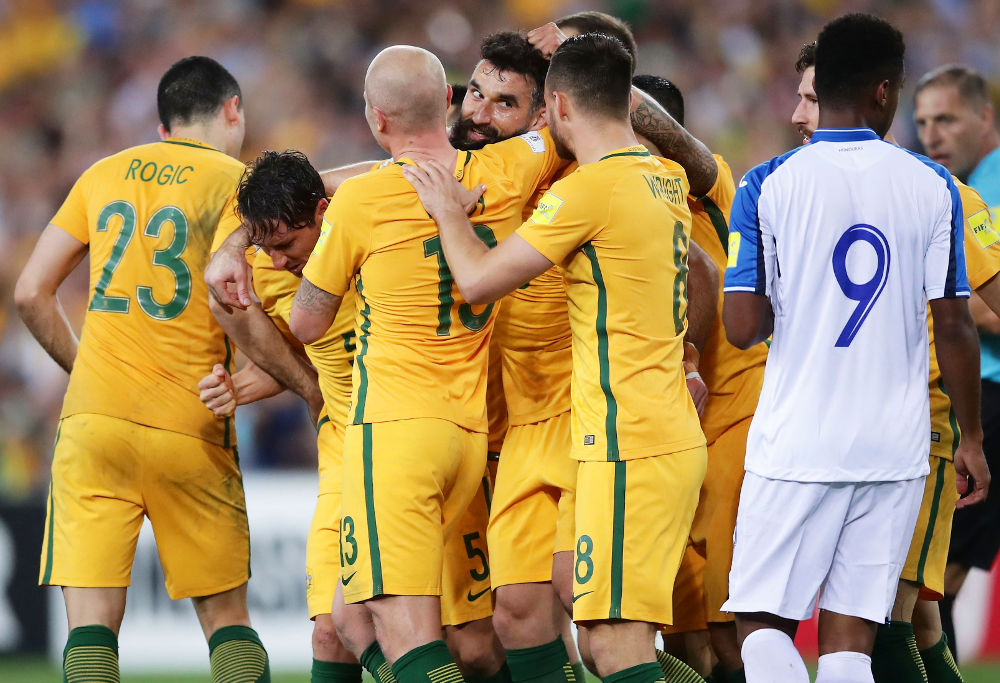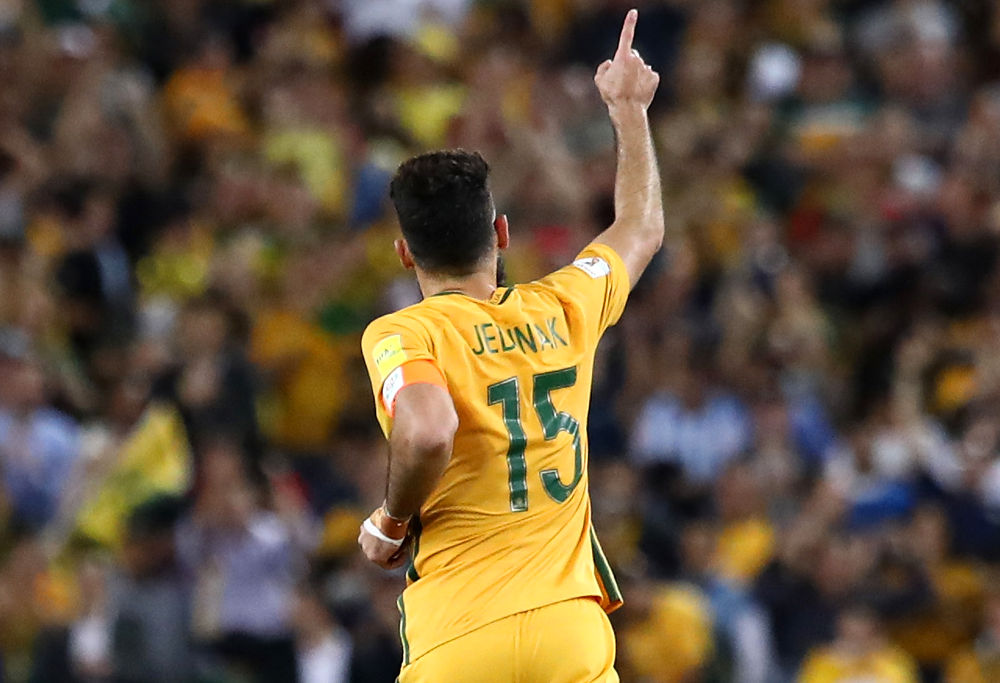So this was it. This interminable qualification campaign, a trudge that has left the Socceroos and their manager weary and battered, had all been funnelled down to a single match.
The oddly placid cradle of a cool, spring Sydney evening was the site, and everyone involved – the raucous herd piling into the stadium, the jersey-clad sots in the local pubs, the tense masses perched on couches at home – all were hoping they would see the final line of this taxing chapter written, and sigh between their cheers as the next one began.
No one will eulogise these last six months with any fondness, few, indeed, will even think to, what with wonderful thoughts of Russia 2018 to occupy the mind.
This World Cup’s qualification process has dragged down more prominent footballing nations than us, to be sure, but no Australian was thinking of joining the Italians, Dutch or Chileans, especially when the task was so immediately at hand.
A 0-0 draw in Honduras meant there was no lingering score to complicate the aggregate. The brief was simple; win at home, and go through.

(Johan Ordonez/AFP/Getty Images)
The set of players selected to fill Ange Postecoglou’s favoured 3-4-2-1 formation was a combination that, for one reason or another, had not yet been tested. Mile Jedinak retained his place at the base of midfield, and Mark Milligan was returned to the starting XI, and stood beside him.
Matt Leckie was also recalled following his suspension, and started at right-wing-back. Aaron Mooy and Tom Rogic played as the two attacking midfielders, and Aziz Behich was retained at left wing-back.
The back three, and goalkeeper, were as they were in the first leg. And finally, gleaming at the tip of this arrangement was Tim Cahill, ankle seemingly nursed back to health, the country’s bonafide difference-maker in our biggest matches. Playing Mooy and Rogic gave the team enough invention in the advanced positions, against an opponent sure to sit back and defend with grit.
Considering Josh Risdon’s ho-hum turn in San Pedro Sula, the two wing-backs were clearly the best available candidates. Milligan and Jedinak’s presence applied a becalming caress over twisting thoughts of a sudden Honduran counter-attack slicing through the Australian gut, although the flanks were still tremulous areas of potential tenderness.
All in all, this appeared to be a highly satisfactory team, well-equipped to take control of the Roos’ most important fixture for some years.
Honduras had made some changes too, with captain Maynor Figueroa back after suspension, one of four new players inserted into their starting line-up. Figueroa’s return, from a leadership perspective, would have been as significant for Honduras as Cahill’s was for Australia, in what was only Honduras’s twelfth international outside the Americas since the year 2000.
The Socceroos kicked off, and immediately dashed as a team up the pitch. An attacking approach, with an early goal, was needed here, and Leckie’s lunge toward a 50-50 – fouling an opponent in the process – signalled the ferocity of the Australian appetite. Matt Jurman was booked after two minutes, another signal. When things are as tense as this, the occasion can lash out, like a stretched rubber band suddenly snapping.

(AAP Image/Lukas Coch)
After ten minutes, the match settled into its expected groove; Honduras weren’t pressing the Roos until the ball was passed out of defence, with the exception of a full-field press to discourage short goal kicks. Australia were met by a solid wall of ten defenders when they did progress into the midfield, and were forced wide, and then backward by the Honduran defensive scheme.
An Australian free-kick out on the left flank was won and taken by Mooy, with Cahill centimetres away from flicking it past Donis Escober. Five minutes later, another Mooy free-kick had the Honduran defenders scrambling desperately to clear; their conviction to avoid concession was flailingly apparent.
On a pitch – albeit far from perfect, a little hard and patchy – significantly more accommodating than the paddock in San Pedro Sula, both teams were playing with more terrestrial ambition, combining neatly and quickly, with tight one-twos and backheeled flicks peppering the general play.
The Roos were dominating possession, but the few sequences that Honduras put together gave a firm indication the visitors were planning on taking a more technically ambitious approach than they had at home.
Additionally, the Hondurans were doing an excellent job of neutering the Australian attacks, pushing them toward the flanks, and doubling up on Cahill in the centre. After half an hour, we saw Cahill roam out to the near sideline, in search of the ball.
He found it, looked up, and saw a Tim Cahill-sized void in the penalty area. It appeared as though Milligan was asked to step up and join the attack when possible, but his presence was doing little to grease the wheels.
Australia were being forced to toil hardily in wider areas; under heavy pressure, Cahill and Behich managed to scratch out a crossing opportunity, the latter fizzing a ball into the box, which Rogic tamely scuffed into the arms of the keeper. The Hondurans were dawdling to every throw-in, tarrying at every stoppage. They had committed twice as many first-half fouls as Australia.
It wasn’t all gamesmanship though; Emilio Izaguirre, injured and distraught, had his ankle treated twice and was eventually substituted. The first half ended with the two teams having enjoyed one solitary clear chance between them. Impotent Australian possession was the story so far.
The second half began with Aaron Mooy taking three straight corners, two of which were awful, one too short, the other spooning horribly over the goal and out. A few minutes later, Rogic ran past half the Honduran team, and won a free-kick just outside the box. Mooy lined up again over the set-piece, hoping for a better connection this time.
In fact, to the surprise of the most – not least the Hondurans – it was Mile Jedinak who jogged up and drove his instep through the ball. His shot wriggled through the wall, and took a heavy deflection off a defender, giving Escober no chance of saving it. The capacity crowd erupted as one, sheer relief at a reward earned with a sprinkle of fortune.

(Photo by Matt King/Getty Images)
The Hondurans charged back at the Socceroos from the restart, furiously trying to restore parity as soon as possible. The game was suddenly yanked out into openness; the Hondurans were lurching forward, and Tim Cahill almost scored on the counter, looping a long-distance header onto the crossbar.
Rogic slapped a volley from an audacious position, curling it into the side netting. The match had awoken wide-eyed, and nothing was certain yet, keeping in mind a score draw would see Honduras progress. The Australian goal, however, forced the Hondurans to throw more behind their attacking efforts, which is to say, do less of what they wanted to do; defend in numbers.
Cahill departed the field, replaced by Juric. The game was rocking back and forth. The ball spilled into the Honduras box, after good work from Mooy on the left. Somewhere in the muddle, the ball struck the arm of a Honduran defender, something it seemed only the referee saw. He pointed to the spot, and Jedinak walked up. He punched the shot into the bottom left corner, just under the straining hand of Escober.
Jedinak ran back to the halfway line, a tsunami of whoops and caws crashing down from the stands, his whole body tensed in vigorous joy, roaring and nodding and pumping his fist. How we’ve missed our captain, even if we’re only realising it now. This was a cushioning goal Australia needed; all that was left was to see out the final 15 minutes.
Honduras, having spent the vast majority of this tie thinking only of tackling, fouling, barging and clearing, now found their attacking senses blunted, their rhythms knocking disparately. Passes were overhit, runs missed. A promising free-kick was sent spiralling high and wide.
A quick Escober punt saw the Hondurans engage Sainsbury and Behich in consecutive aerial duels. Mat Ryan scampered out to retrieve the situation, and then, a few seconds later, Robbie Kruse – a substitute – was sent clear through on goal, dashing onto a deep cross from the right.
He was brought down just before shooting, and another, wholly more conspicuous penalty was awarded. Jedinak converted again, 3-0, and Australia’s place at Russia 2018 was all but confirmed. Honduras tried hard in the dying minutes, dead men running. They scored a consolation goal with the game’s final kick.

(Photo by Cameron J Spencer/Getty Images)
In a contest cracked open by a bit of luck – Australia’s first goal was later reassessed as an own-goal – it was Australia’s quality that shone through. Under the most intense circumstances, with every moment of failure, of frustration, of impatience all carried on green and gold shoulders into this ultimate test, the Socceroos blossomed into the team we have been yearning for, back three and all.
Harrowing failure, a horrid founder, will not flavour Ange Postecoglou’s legacy. Jedinak, every fibre of him gleaming with dazzling heroism, was draped in the Australian flag at the end. Fireworks boomed across Sydney Harbour as the crowd rang in the triumph. The slog is over, and we survived it. Onward, gloriously onward we go to Russia.

































































































